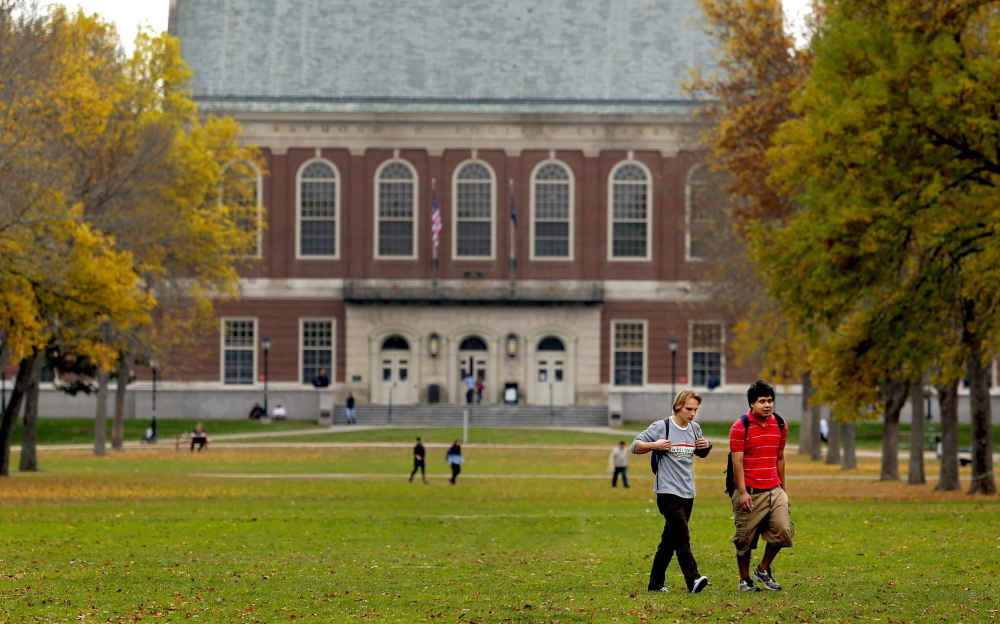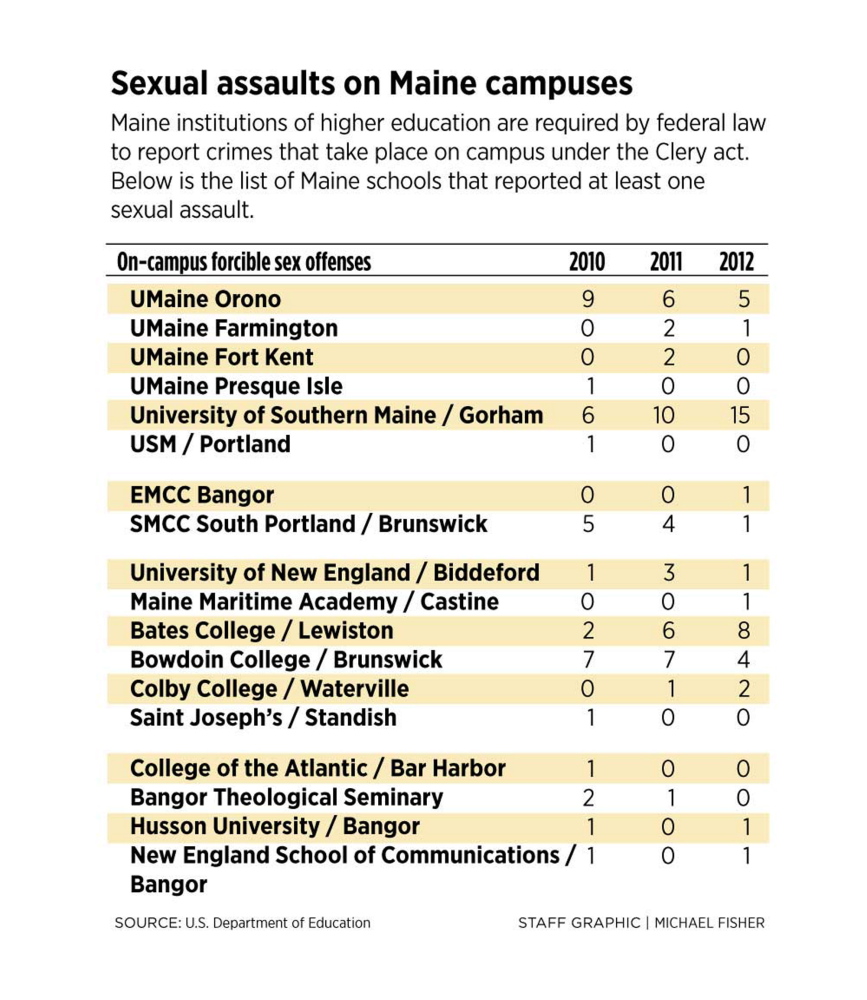Campus officials at several of Maine’s largest colleges say they have already adopted many of the recommendations released Tuesday by a White House task force that urged colleges nationwide to do more to deter sexual assaults on campus and provide victims with resources and support.
“From what I’m reading, we’re really on target,” said Mark Nahorney, dean of students at University of New England in Biddeford, after reading the recommendations. “But this isn’t something we take for granted. Some of this is about being vigilant.”
The recommendations stem from a 90-day review by the task force, which President Barack Obama created after his administration heard complaints about the poor treatment of campus rape victims and the hidden nature of such crimes. The administration also launched a new website, notalone.gov, that offers victims links to local resources and information about filing a complaint.
Nahorney said UNE has increased its focus on sexual assaults in recent years, and now gives online and PowerPoint presentations to students on sexual harassment, assaults and tips on how to intervene as a “bystander” in certain situations. Students have access to confidential on-campus and off-campus counseling services, are encouraged to report a sexual assault to local police if they wish, and are assigned a trained campus employee to act as their advocate for any meetings or hearings.
That’s in line with task force recommendations that schools have a victim advocate, robust prevention efforts and confidential consulting services.
“We put the victim in the driver’s seat,” said Don Clark, the school’s director of safety and security. UNE, which has about 5,000 students, had one sexual assault in 2012, and three in 2011.
One of the criticisms of the official crime statistics reported to the federal government under the Clery Act is that they vary widely, and many critics say they underreport the number of actual crimes. Schools failing to properly report campus crime under the Clery Act jeopardize their federal funding.
“Prevention and education programs vary widely, with many doing neither well,” the task force said in its report.
“And in all too many instances survivors of sexual violence are not at the heart of an institution’s response: They often do not have a safe, confidential place to turn to after an assault, they haven’t been told how the system works and they often believe it is working against them. We heard from many who reached out for help or action, but were told they should just put the matter behind them.”
The Clery Act numbers reported by Maine colleges show higher assault numbers at the larger campuses. Some show big increases in recent years, but that’s not the result of more crime, officials say: It’s the result of better training and efforts to increase reporting of sexual violence on campus.
The University of Southern Maine’s Gorham campus, where the dormitories are located, reported 15 sexual assaults in 2012, up from six in 2010. USM has about 9,000 students.
USM officials say the higher figures are a result of a federal grant from 2009 to ramp up campus education and resources around sexual assault.
“One of the first things we did was create a culture of reporting,” said Joy Pufhal, the executive director of student life and dean of students. “The increase in numbers reflects an institution that is responding. There’s an awareness that we have a zero tolerance, that it’s a serious crime and we’re prepared to deal with it.”
By comparison, the University of Maine in Orono, with more than 10,000 students, reported five sexual assaults in 2012, down from nine in 2010.
But Vice President for Student Life Robert Dana said UMaine’s numbers will go up in the next reporting cycle, the result of beefed-up education and reporting efforts there that started in earnest in March 2013, when the campus president ordered a full review of sexual assault policies and named Elizabeth Lavoie as the Title IX and sexual assault and violence prevention coordinator.
“We launched a full-scale comprehensive program,” Dana said Tuesday. “The good news is that all of the suggestions in today’s report reflect our program perfectly. We feel like we’re in the right place.”
USM senior Liz Bilodeau, who does outreach to fellow students about sexual offenses on campus, said she welcomed more federal attention to the issue.
“Because of society’s views and the stigma, I think sexual assault is a huge issue. We need to get the information out that it’s not the victim’s fault,” said Bilodeau, 23, an intern with the campus Student Life office. “I think in order to change society’s views we need to be kind of in people’s faces.”
Colleges have to report an on-campus sexual assault to the local police department only if there is an imminent danger or an ongoing dangerous situation; beyond that, campuses leave it up to the victim to decide whether to report an assault to police.
Nahorney noted that UNE’s policy is to remind victims at each meeting that they have the right to report the assault to local police.
The task force made its recommendations after dozens of in-person and online meetings with victims, advocates and higher education representatives.
Lisa Maatz, vice president for government affairs with the American Association of University Women, called the recommendations a “game changer” that can “only be helpful in addressing this issue and dealing with it head-on.”
That “head-on” attitude is evident at UMaine, Dana said. Under Lavoie, the Orono campus has new presentations for students in freshman orientation, dormitories, athletics, Greek societies and other groups, along with new posters and signs on campus – some in bathroom stalls – that list resources for sexual assault victims. The campus also has advocates available around the clock, Dana said.
“It used to be these things were important. Now they’re important and talked about in almost every corner of the institution,” he said.
That means more reports, however.
“Our numbers will go up rather dramatically, like USM’s did,” Dana said. “I’m glad for that. It’s much more realistic . . . (and) you’re going to see that across the nation” as campuses adopt the new federal recommendations.
The task force noted that Title IX, which prevents gender discrimination at schools that receive federal funds, is a key tool in regulating how institutions handle sexual violence. It is increasingly being used by victims who say their school failed to protect them, federal officials say.
Title IX, traditionally associated with fairness in athletics, also requires that schools actively work to prevent sexual crimes, promptly investigate complaints and discipline the accused if it’s more likely than not that violence occurred. The school can’t retaliate against students who file complaints and must ensure that victims can continue their education free of ongoing harassment.
Several Maine college administrators said a 2011 letter from federal officials that publicized Title IX’s sexual assault provisions was a turning point in their own efforts to beef up campus resources.
At Bates College in Lewiston, the letter prompted an overhaul of the school’s policies, said Title IX officer Heather Lindkvist. Among the changes were new bystander intervention training sessions, anonymous campus surveys of students about sexual assaults, and new education efforts. The college’s Clery Act sexual assault figures jumped from two in 2010 to eight in 2012.
“I think anybody who thinks having a low or zero number is good is misinformed,” said Lindkvist. “I would say (the increase is) evidence that what we’re doing is being effective.”
At USM, the 2011 letter led to the decision to make all campus employees – staff, faculty, resident advisers – “mandatory reporters” with an obligation to inform Pufhal if they hear about a sexual assault. At some schools, only certain people are considered mandatory reporters.
Once Pufhal is notified of an assault, she personally contacts the victim to explain what resources are available. Much of what happens next is up to the victim, she said. The victim can choose to report it to Gorham police or campus police, or have the case investigated by the campus conduct office – which may lead to its being heard by a student conduct committee – or not to disclose any details at all.
The 2011 letter also led to change in the conduct committee process, she noted. In the past, the victim could not appeal a decision, but now either party can appeal.
Noel K. Gallagher can be contacted at 791-6387 or at:ngallagher@pressherald.com
Send questions/comments to the editors.




